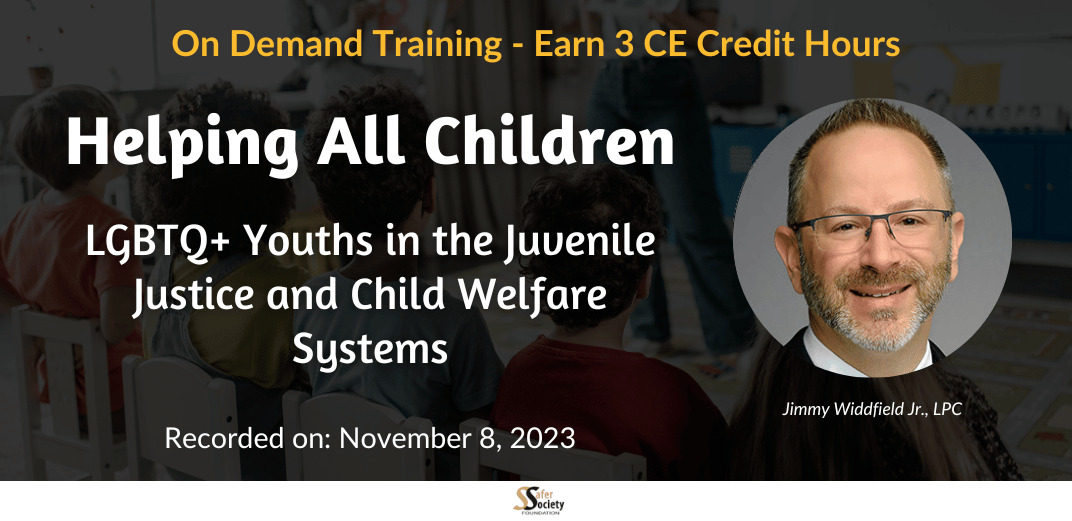
Helping All Children: LGBTQ+ Youths in the Juvenile Justice and Child Welfare Systems
Already purchased an On Demand training?
Click here to access your Safer Society On-Demand Training Center account.
Youths who identify as LGBTQ+ are as dynamic as the conversations our society is having about them. They are at significantly higher risk for multiple adverse experiences across settings (e.g., home, school, community), and they are over-represented in child-serving systems like juvenile justice and child welfare, where they are more likely to experience more punitive outcomes. All too often, this is simply because of who they are as authentic people. Professionals who work directly with children and adolescents and their families, especially in the fields of child maltreatment, child trauma, and juvenile justice, should be educated on LGBTQ+ youths and the issues they face in order to provide best practices that support positive outcomes.
Professionals benefit from training on intercultural education and are often required to receive such training per licensing requirements and, for those affiliated with Children’s Advocacy Centers, national accreditation standards. This presentation enhances the knowledge of all child maltreatment professionals on LGBTQ+ youths and culture, statistics on adversity and trauma for these youths. It focuses on entry points to child-serving systems, and affirmative strategies that are considered best practice in the field. The intended audience is all professionals in fields affected by child maltreatment and those who serve LGBTQ+ youths.
Training topics include:
- Understanding sexual orientation, sexual identity, and gender expression among youths who identify as LGBTQ+
- The increased likelihood of adverse effects of being an LGBTQ+ youths
- LGBTQ+ youths and the child welfare system
- LGBTQ+ youths and juvenile justice
- LGBTQ+ affirmative services
- What being an LGBTQ+ affirmative professional means
1) Describe sexual orientation, sexual identity, and gender expression among youths who identify as LGBTQ+.
2) Explain at least two ways in which youths who identify as LGBTQ+ are affected by being their authentic selves.
3) Describe one way in which youths who identify as LGBTQ+ are impacted by involvement in child welfare, law enforcement, and juvenile justice systems.
4) Apply three strategies for more effectively serving youths who identify as LGBTQ+ and their families.
Audience
This training is for professionals working with people who have perpetrated abuse. Professionals who will benefit from this training include social workers, psychologists, clinical counselors, and interested paraprofessionals.
Content Level
Disclosure
Continuing Education Approval
American Psychological Association (APA)
Safer Society Foundation, Inc. is approved by the American Psychological Association (APA) to sponsor continuing education for psychologists. Safer Society Foundation, Inc. maintains responsibility for this program and its content.
Who's Presenting

Jimmy Widdifield, Jr., LPC
Jimmy Widdifield, Jr., MA, is an experienced training and technical assistance provider in child maltreatment, trauma, and adversity; children and teens with problematic (including illegal) sexual behavior, recipient children, and their families; children and teens with marginalized sexual orientations and/or identities; and supporting the multidisciplinary coordinated response to child abuse and neglect. He is a Licensed Professional Counselor in Oklahoma who is trained in several evidence-based treatments that address childhood adversity and trauma.
